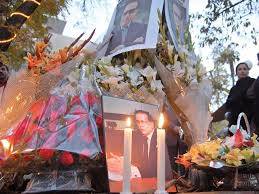He didn’t have to do it. It would have been much easier to stay away from an issue as thorny issue as that. It didn’t directly affect him, his family or even his class interests. Even if he chose to support the aggrieved party, he could have stayed in the background. Unlike most of his compatriots, he took the path less travelled by. It is possible to believe in something and fail to live up to it. Few people, in this day and age, are willing to lay their lives down for their convictions. Salmaan Taseer was one of them.
He was a dedicated political worker throughout his life in addition to being a successful entrepreneur. His father, Dr. Muhammad Din Taseer (M.D Taseer), was an educationist and public intellectual. M.D Taseer was initially part of the progressive writers’ movement that shook the sub-continental literary scene, but adopted a nationalist line after the division of United India. He pleaded Pakistan’s case in the United Nations at one point. Salmaan Taseer was only six years old when his father passed away. He joined Zulfikar Ali Bhutto’s Pakistan People’s Party in the late 1960s and went on to author his biography after he had been hanged on trumped up charges by Zia’s regime. He helped organise the historic welcome received by Benazir Bhutto in Lahore, upon her arrival in 1986.
Salmaan Taseer was active in Punjab’s politics during the democratic period (1988-99) and was once elected Member of the Punjab Assembly. He was appointed Governor of Punjab during the last PPP government (2008-13). In 2009, the Aasia Bibi case gained prominence, in which a dispute over water was blown up into a blasphemy charge resulting in a death sentence for a Christian woman. The threat of ‘blasphemy’ has been used for the last three decades against non-Muslims citizens of Pakistan, with a blasphemy charge ultimately resulting in either death or incarceration. While the original law was drafted by the British Raj, its modern incarnation was introduced by General Zia’s regime. During the Islami Jamhoori Ittehad (IJI) government (1990-93), the death penalty was fixed as the only punishment for a blasphemy charge. The threat of ‘blasphemy’ has been hung like a Sword of Damocles over the head of Pakistan’s minorities.
In the last three decades, none of Pakistan’s political elite had the courage to challenge the blasphemy law. Salmaan Taseer bucked the trend by visiting Aasia Bibi in prison and publicly demanding appropriate amendments to the controversial Law. He clarified in his statements that the Blasphemy Law was not a ‘word of God’ but a human construct and it could be amended. The Mullah brigade did not tolerate what they thought was encroachment upon their turf and called for blood. Public rallies were organised by religious outfits in major cities of Pakistan demanding Taseer’s head and an apology. A female news anchor had the gall to accuse the governor of blasphemy on live television. The stage was set. Mr. Taseer refused to bow down to pressure. He retained his wit and his tweets from that period showcase his defiance and pride in taking the moral stand.
This, however, is no country for moral, honourable men. Salmaan Taseer was assassinated by his own gunman on 4th January, 2011 at Kohsar Market, Islamabad. With Salmaan Taseer, any space left for a healthy public debate on the merits or demerits of the blasphemy law was buried. I remember receiving the fateful news and struggling with the flood of emotions that came with it. The incident was an indication that the mullahs would silence anyone who dared challenge their hegemony. In the aftermath of Mr. Taseer’s assassination, I gained political conscience and began writing down my thoughts. I wish the wake-up call hadn’t been this cruel. ST’s assassin was showered with rose petals by lawyers and he became a poster boy for Sunni Tehreek and Barelvi groups. Mumtaz Qadri became the embodiment of the notion that one can kill other people if they disagree with your faith.
The assassination also exposed the dwindling number of secular forces active in the country. None of our major political parties claim the legacy of Mr. Taseer, which is a shame. Murdering people in the name of religion has become our society’s specialty. As if this was not enough, Mr. Taseer’s son was abducted by the Taliban and is yet to return home. One has to sacrifice for one’s principles but one should not be forced to sacrifice this much for believing in the right thing.
Fasi Zaka paraphrased the aftermath of Mr. Taseer’s assassination better than anyone else in the following words: “After the killing of Salmaan Taseer, the silent majority of Pakistan finally spoke. They liked it. It didn’t matter what class they were from, what clothes they wore, how many years of education they had. They agreed with murder most foul.”
The writer is a freelance columnist. Follow him on Twitter
Saturday, April 20, 2024
My hero

The writer is a freelance columnist. Follow him on Twitter
US considers over $1bn weapons deal for Israel amid Middle East tensions
11:09 AM | April 20, 2024
6 drug peddlers arrested
April 20, 2024
Bilawal demands govt to hold ‘tripartite dialogue’ to curb terrorism
10:58 AM | April 20, 2024
Police intensifies crackdown on polluting vehicles
April 20, 2024
Policitising Tragedy
April 20, 2024
Tehran to Rafah
April 20, 2024
A New Leaf
April 20, 2024
A Tense Neighbourhood
April 19, 2024
Dubai Underwater
April 19, 2024
Dangers of Deepfakes
April 20, 2024
Feudalism
April 20, 2024
Kite tragedy
April 19, 2024
Discipline dilemma
April 19, 2024
Urgent plea
April 19, 2024
ePaper - Nawaiwaqt
Advertisement
Nawaiwaqt Group | Copyright © 2024





